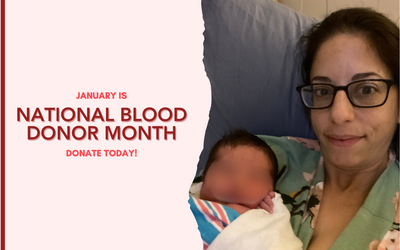
By Amy Steinmann, CDC Team Member
I entered the hospital to give birth to my second child thinking I knew exactly what to expect. My labor started by induction that evening and progressed as expected into the next day. By early afternoon, my doctor had broken my water, an epidural had been placed, and I was ready to push. An hour later my daughter was born.
As I began bonding with my baby, the nurses began my postpartum care. While some blood loss is expected during this time, my blood loss was significant, and my blood pressure was rising. My doctor removed fragments of placenta that had not been delivered, and I was given medication to reduce the bleeding and my blood pressure.
About an hour later, the nurses returned for a blood pressure check and more postpartum care. My blood pressure readings were concerning, and my bleeding was increasing again. I started feeling lightheaded and it was decided that I needed emergency surgery to remove additional placenta fragments my doctor was concerned I had retained. On the way to the operating room, my blood pressure crashed. I was in and out of consciousness and experiencing a massive obstetric hemorrhage.
The surgery was successful, and my bleeding subsided, however, due to the massive blood loss, my doctor ordered two units of blood. About an hour after surgery, the nurse who called the blood bank was told that because of an ongoing blood shortage, and because my hemoglobin level was normal when I was admitted, they could not release the blood. Despite providing my quantitative blood loss, the blood bank asked for another blood draw. Once my hemoglobin was deemed low enough, the blood was released.
Donate Blood Today
If it were not for the incredible hospital nurses, my doctor and the blood that I received, I would not be here to share my story and watch my two daughters grow up together. But I am not the only one who has been affected by a blood shortage. Chronic disease patients who depend on transfusions, like individuals with sickle cell disease or certain types of cancers, are at an increased risk of complications when there is a blood shortage. During National Blood Donor Month in January, I encourage you to donate and be the one who saves the life of a new mom or ensures the quality of life for someone with a chronic disease.